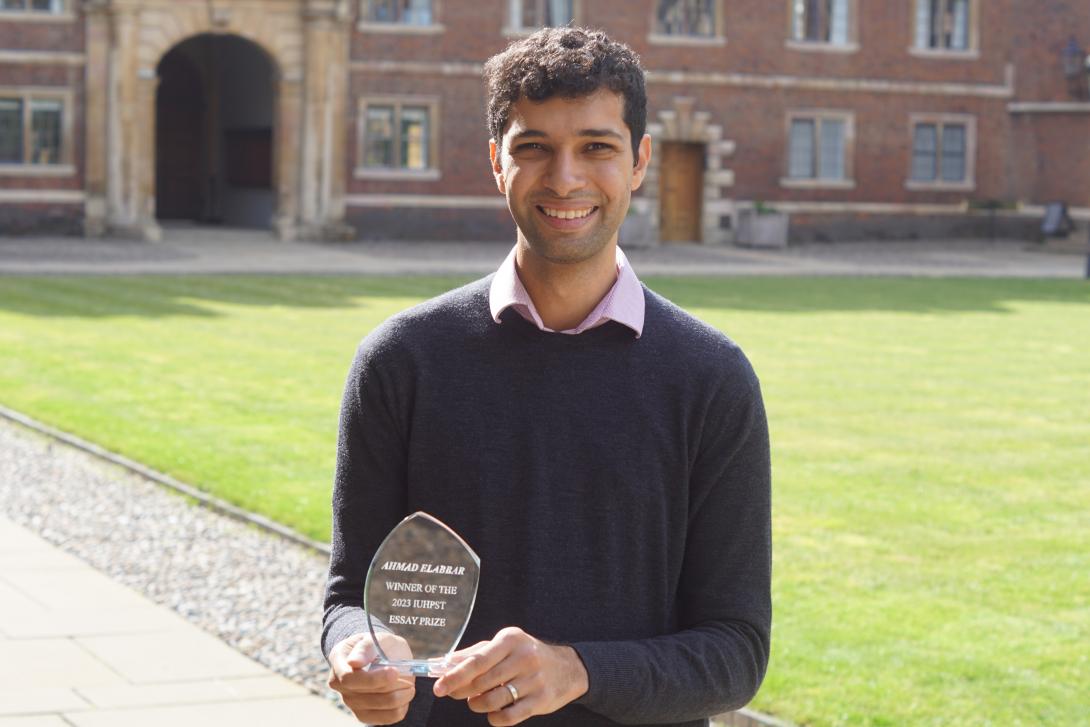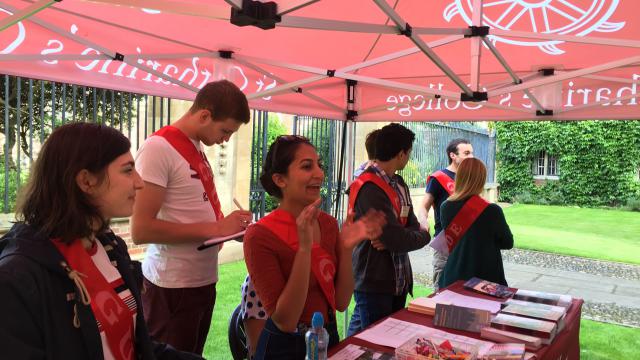
Research into the role of justice in global climate assessments by a St Catharine’s postgraduate student has won awards from leading international bodies, the US-UK Fulbright Commission and the International Union of History and Philosophy of Science and Technology (IUHPST).
After completing his MPhil at St Catharine’s, Ahmad Elabbar (2019, History and Philosophy of Science and Medicine) chose to stay on to study for a PhD with the Department of History and Philosophy of Science. His thesis is focused on “Justice as an ideal for climate assessment: A study of the Intergovernmental Panel on Climate Change (IPCC)”.
He commented, “I initially chose Catz back in 2019, having researched its friendly culture, its location as one of the closest colleges to my department and even the availability of couple’s accommodation for me and my wife, Katie. The College’s support ensured we enjoyed a great introduction to Cambridge and we have since made the city our home, ahead of my son’s birth at the start of the year. The sleepless nights during his first months were a bit of a daze – without Katie's support, and help from my family, I wouldn't have been able to compete for these prizes!”
Fulbright Award
In March 2023, Ahmad received a Fulbright All Disciplines Postgraduate Award from the US-UK Fulbright Commission. The Fulbright programme is now considered amongst the most prestigious scholarship awards globally, with 60 Nobel Laureates and 39 Heads of State/Government among its 390,000 global alumni. The Award has enabled Ahmad to further his PhD research through a four-month collaboration with the Institute for Practical Ethics at the University of California, San Diego (UCSD).
He said, “Upon learning I received the Award, I was overwhelmed with gratitude. I felt honoured personally, and also delighted at the recognition the Award gives to my area of study, the intersection of climate science and climate justice, which reveals the central importance climate change has assumed in the eyes of the Fulbright Commission.
“As a Fulbright scholar, I have been able to pursue an innovative line of inquiry that aims to link climate knowledge production with issues of climate justice. The Award has specifically funded a chapter of my PhD investigating the practice of epistemic rationing – how scientific evidence is condensed by groups like the IPCC into summaries for policy makers. I hope this work will enable me to make a significant social contribution, from within the academy, to one of the great challenges facing our world today.”
Having grown up between cultures and countries, moving as a child from Leicestershire to Medina and back again, Ahmad developed an interest in global issues that cross borders and present challenges to diverse communities and ways of life. As such, climate change soon became Ahmad’s focus of study, a common thread throughout his academic journey, which began with a Master’s in Physics from Loughborough University and a Master’s in Philosophy from the University of Oxford, before he joined Catharine’s.
Along the way, Ahmad noted a separation in popular and ethical debates over climate justice, which insulate climate science from questions of justice, giving the impression that justice is not a concern for science. His project at the Institute for Practical Ethics at UCSD aims to bridge this separation, placing justice at the heart of climate assessment.
IUHPST Essay Prize in History and Philosophy of Science 2023
Ahmad won this prestigious award for his essay entitled “The curatorial view of assessment and the ethics of scientific advice: Beyond decisional autonomy towards distributive epistemic justice” (available to read from the IUHPST website). He recently presented his essay and was officially awarded a trophy and $1,000 prize during the 17th International Congress of Logic, Methodology and Philosophy of Science and Technology, which was held 24–29 July 2023 in Buenos Aires – the first time this conference had been held in the southern hemisphere.
The IUHPST’s biennial essay competition seeks to encourage fresh methodological thinking on the history and philosophy of science as an integrated discipline. The 2023 prize question was: “How can history and philosophy of science, technology, and medicine help us to understand and evaluate the role of values in science?”
Ahmad explained, “I originally entered the essay competition because it seemed like a good way to bring climate justice to the attention of a wider, multidisciplinary audience. New-born baby aside, it was always going to be tough to condense the first two years of my PhD into a 10,000 description of the ethics of global assessments, but I am so glad I attempted it. I am grateful for the opportunity to present my research for the first time in July, and to the delegates who provided so much positive and helpful feedback.”
Announcing Ahmad’s prize, the Joint Commission said:
“[His] thoughtful, well-argued, and evocative essay tackles the question of how values do and should inform the presentation of policy-relevant scientific data and judgments, using the production of IPCC reports as a case study. It introduces an insightful analogy between museum curation and the sort of information curation practices that occur in the production of these reports. Elabbar describes how the selection, ordering, emphasis, and contextualisation of scientific data targeted at policy audiences is inherently value-laden, with the epistemic risks associated with each stage of the process illustrated through a comparison with the decisions that guide the display of museum objects.
“Elabbar argues that strategies for negotiating values in policy-relevant science explored in the literature all share a commitment to preserving the ‘decisional autonomy’ of policymakers—their ability to apply their own values to policy decisions informed by science—yet they fail to preserve such autonomy. He proposes that we instead understand scientific assessments of policies and their ethics from the perspective of distributive epistemic justice. Scientists curating large quantities of policy-relevant data should aim to mitigate against asymmetries among stakeholders in access and ability to manipulate expert knowledge.
“Elabbar’s essay provides an interesting and novel approach to the issue of values in science by extensively analysing scientific literature together with work in sociology and museum studies. We commend him for the depth of research and rigorous argumentative approach that this essay achieves.”





